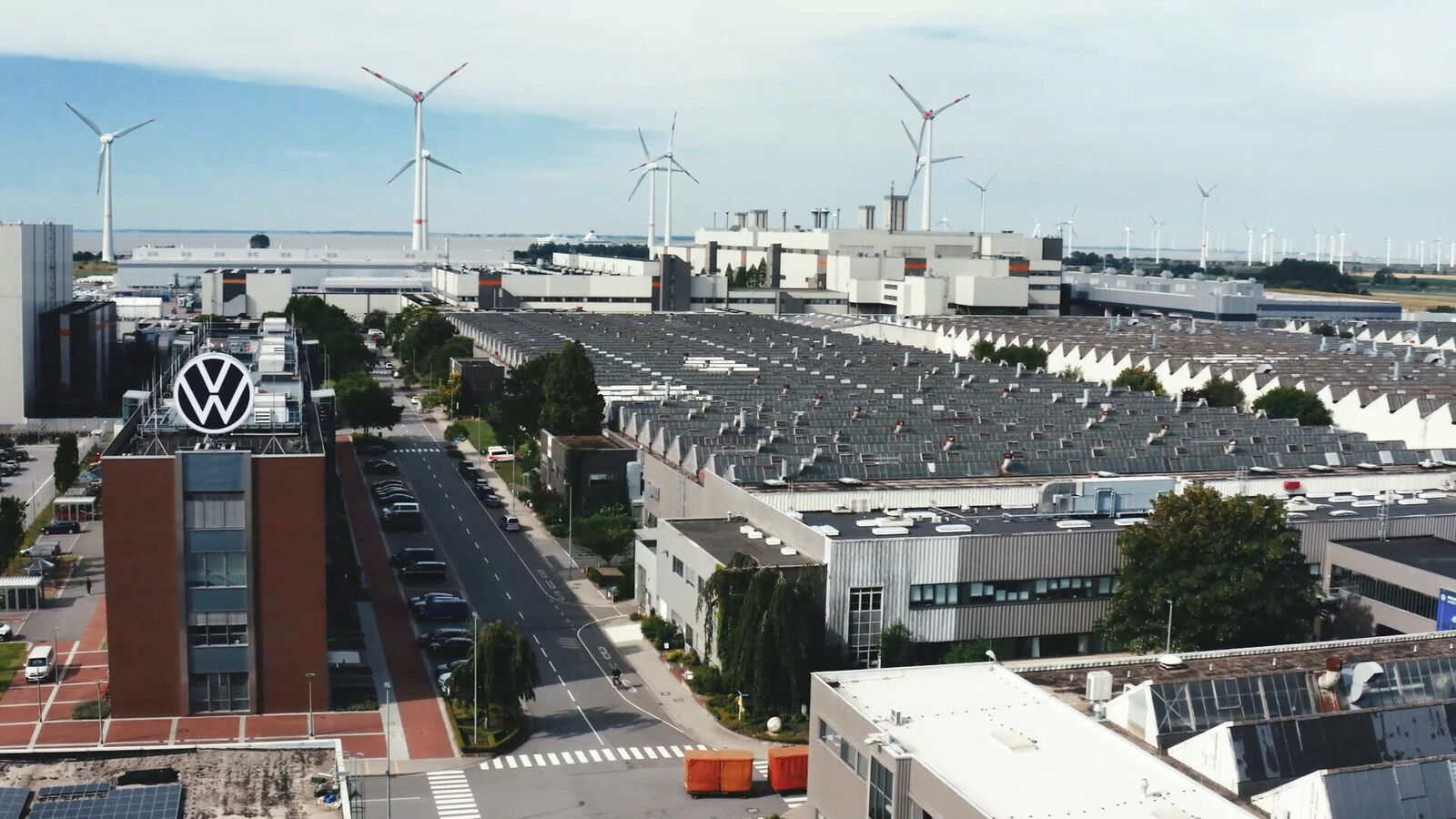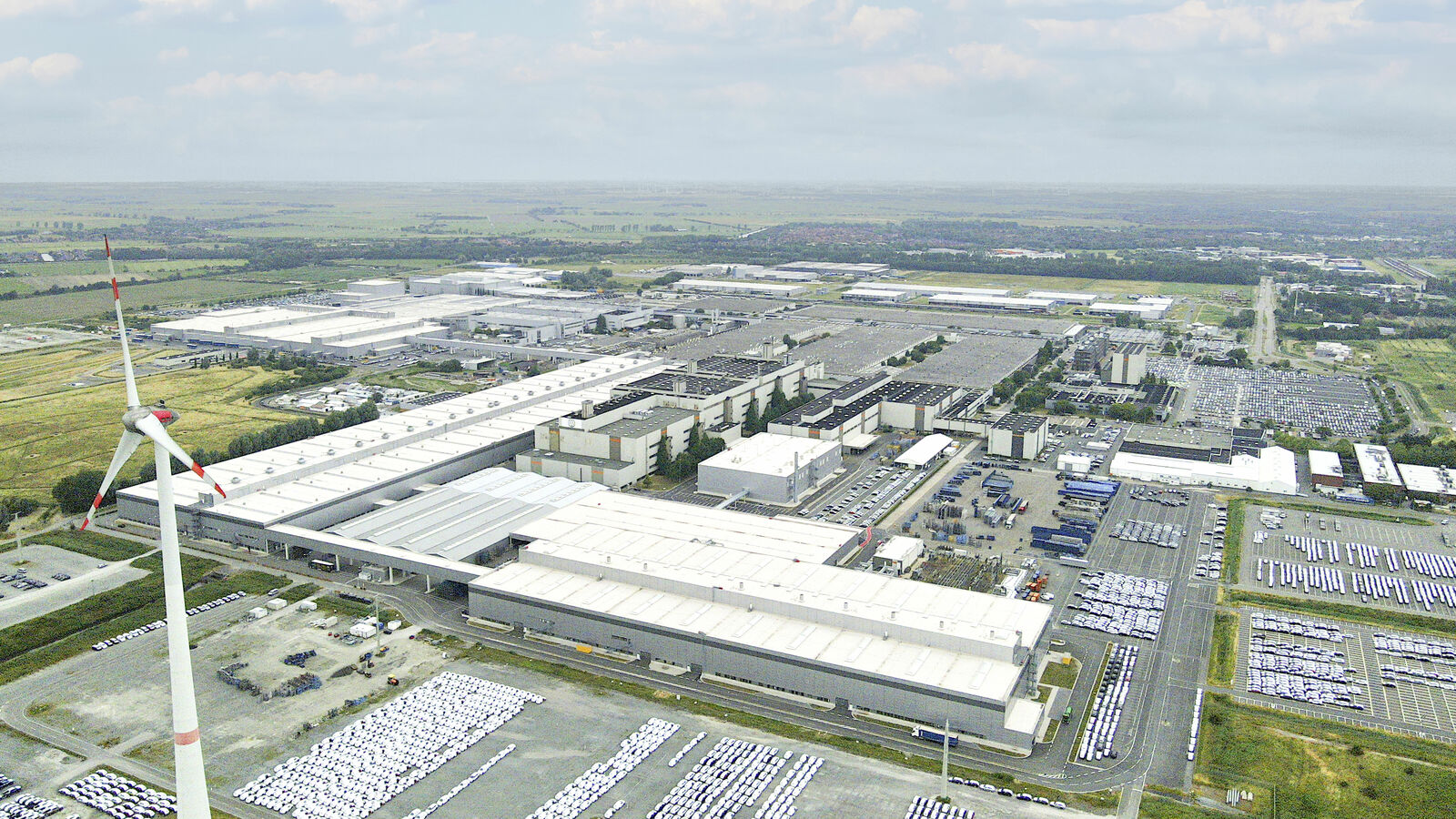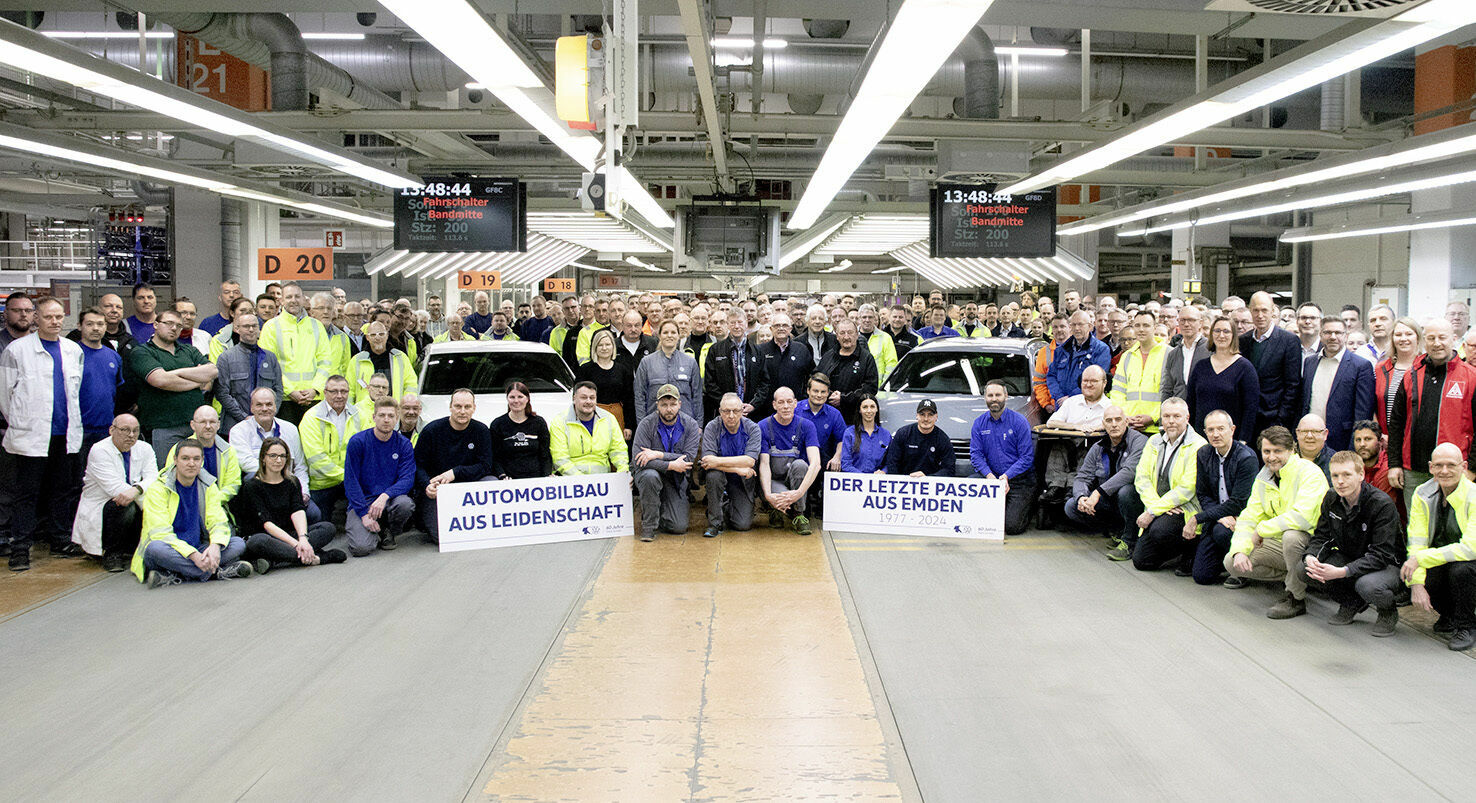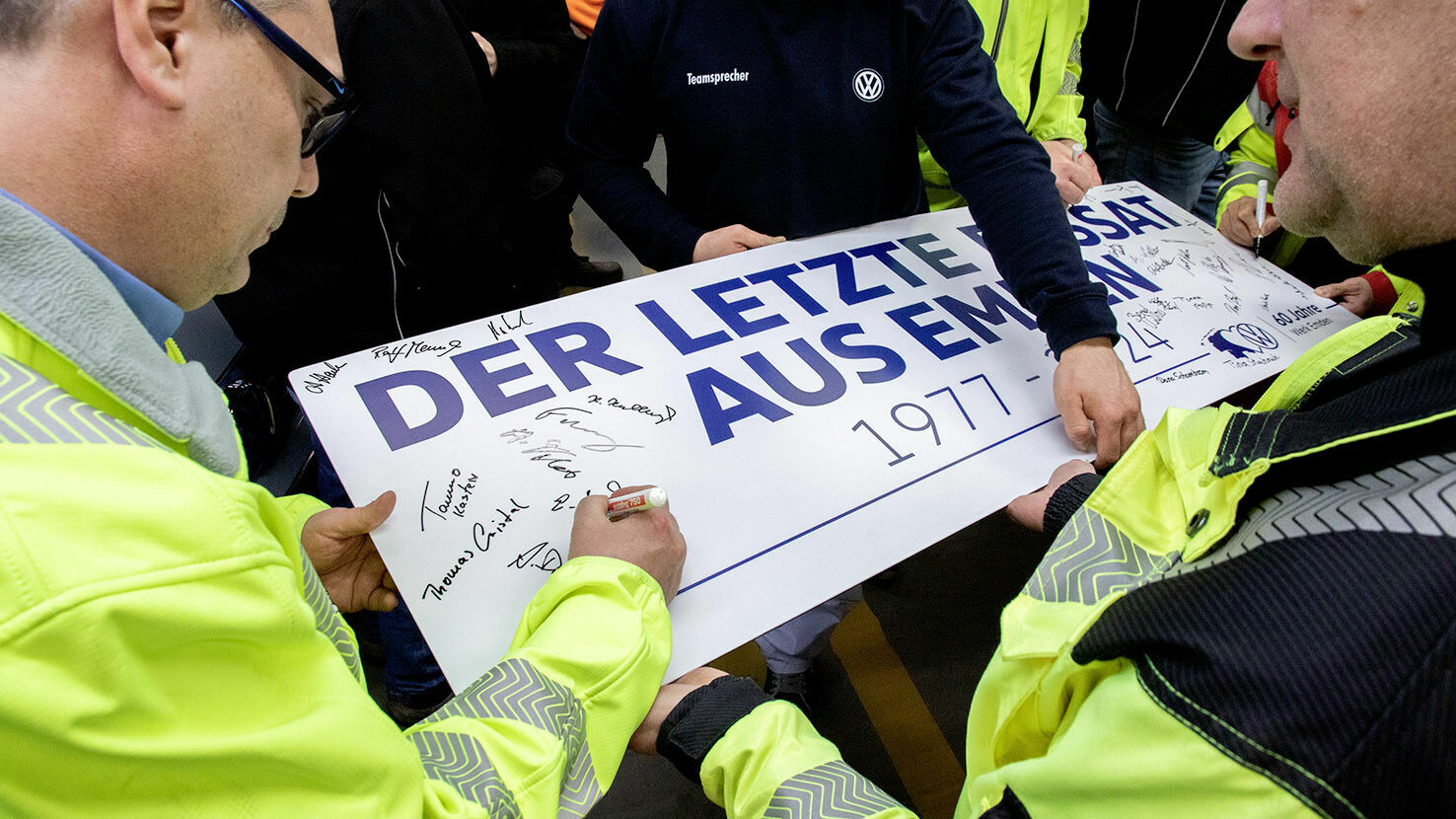As of November 20, 2024
Volkswagen AG
Emden plant
Information for the Press
| Area: | 4,300,000 m2 |
| Production: | around 180,000 vehicles (12/2023) |
| Models: | ID.4, ID.7, ID.7 Tourer |
| Employees: | More than 8,000 (excluding work-study degree students, trainees and Group employees) |
| Plant Manager: | Enno Fehse |
Plant
Volkswagen in Emden is the largest industrial employer to the west of Bremen and to the north of the Ruhr region. The Volkswagen plant occupies a total area of 4,300,000 m². In addition, the premises also include space used for vehicle shipping and a vehicle test track.
Transformation
The Volkswagen brand is consistently and systematically moving forward with plans to convert its plants to electric mobility. As of 2022, the north is electric, too: the Volkswagen Emden plant is the first site in Lower Saxony to be converted for the production of electric vehicles, a process that has been ongoing during live operation since 2020 – setting a new milestone in the accelerated ramp-up of electric mobility within the framework of the ACCELERATE brand strategy. To achieve this, new structures and existing systems have been integrated precisely in order to 0o1 ptimally prepare the site for future demand.
The ID.4 has been rolling off the production line at Emde n since May 2022, with the four- door fully electric ID.7 following suit in summer of 2023. This year, a third fully electric model will follow: the ID.7 Tourer.
Production
The declared aim of the Volkswagen plant in Emden is to produce environmentally friendly vehicles in an environmentally friendly production process. In addition, high production quality is the key to success, because quality generates customer satisfaction and is therefore a critical factor in terms of pricing and competition. Volkswagen has invested more than 1 billion euros in the site for the future-oriented production of electric vehicles. Without stopping production, the plant was converted into one of the most modern factories in the automotive industry and is a flagship project for electric mobility.
Around 180,000 vehicles were produced at Emden in 2023. The Emden site has been producing vehicles for the Volkswagen Group for 60 years. Since the site was founded in 1964, more than 12.5 million vehicles have rolled off its production lines.
Environmental protection
Environmental protection is a core element of strategic decisions at the Emden site. With its conversion to a purely electric plant, the Volkswagen plant in Emden conceived its vision of becoming a “carbon-neutral balance sheet factory” by 2030. Numerous measures are being planned and implemented for this purpose, in particular with regard to increased use of renewable energy.
Port
The port of Emden is the third largest automobile transshipment port in Europe. At the port, virtually all models of Volkswagen Group brands shipped from European and overseas ports are handled by Volkswagen Group Logistics and Autoport Emden GmbH. Around 600 ships, 160,000 railcars and 35,000 lorries arrive at the mouth of the Ems river every year, delivering and collecting cars. Imported vehicles from Portugal, Spain, Mexico and South Africa are distributed across Europe from Emden. Automotive manufacturers also export their vehicles across the world from Emden, for example to the USA, the UK, Canada, Mexico, Japan, Taiwan, Spain or Portugal. In 2023, around 1.3 million vehicles were shipped through the port of Emden. Around a third of these were electric vehicles (BEV & PHEV).
Industrial estate
Volkswagen has provided support for the “Frisia” industrial estate being developed on the former Frisia refinery site by the municipality of Emden with aid from the state of Lower Saxony and the EU since 2003. Alongside other companies and start-ups, the park is also home to Volkswagen suppliers. Currently, 12 suppliers produce components for the Volkswagen Passat there and supply them to the plant using the just-in-sequence approach.
Logistics
With combined traffic, the Emden plant has moved away from lorry transport, with materials being delivered in bundles by rail and only partial journeys being made by lorry. Instead of 170 lorries, only five freight trains are required. The aim of this change was to reduce carbon emissions. To be precise, the switch from road to rail has allowed the plant to reduce its carbon emissions by around 10,000 tonnes a year.
Employees
More than 8,000 employees work at the Emden site. Volkswagen takes responsibility for its workforce: processes at the Emden site are continually reviewed with respect to health, safety and ergonomics, optimised and adjusted to meet the needs of employees.
In addition, the Volkswagen plant at Emden offers young people the opportunity to train in a total of 11 different apprenticeships and currently five dual work-study programmes. Each year more than 100 apprentices and students on these courses have an opportunity to train with one of the world’s largest automotive manufacturers and then to be employed within the Volkswagen Group.
Plant management
Enno Fehse has been in charge at the Emden site since 2019. Enno Fehse completed his vocational training at Volkswagen. After finishing his studies, he began working as a logistics and IT planner at Volkswagen in 1998, followed by leadership roles in logistics and quality assurance, as well as overseas assignments in China and India. In 2013, he returned to Wolfsburg, where he led, among other areas, international supply chain management and material logistics. Since December 2021, he has been responsible for production control and logistics at the Volkswagen brand.
History
On 4 February 1964, the State of Lower Saxony, the Waterways and Shipping Authority, the City of Emden and Volkswagen AG agreed the sale of around 200 hectares of industrial land directly adjoining the port. There were two main reasons for choosing Emden as a factory site. One was the Port of Emden, which, as one of Germany’s most important seaports, offered the shortest transport route to overseas markets. The other was the large labour force available in the East Frisia region: Emden and East Frisia were among the most economically depressed areas of western Germany. At that time, the region had an unemployment rate of around 25%, compared to 8.9% today. As production volumes rose, the workforce of the plant grew from the initial figure of 790 to over 3,000 in 1965, in just one year.
The fifth Volkswagen plant on German soil was built in just nine months, with the first Beetle rolling off the production line on 8 December 1964. Volkswagen Emden initially specialised in producing Beetles, primarily for the North American market. However, over the 50 -year history of the site, many other Volkswagen models such as the Type 2 Bus, Golf I, Type 181 Kurier, Audi 80, Santana, Type 4 Bus and Taro have been produced here. The Passat has been built at Emden since 1977, and this site has been the lead plant for the model throughout that time. The eighth generation of the Passat is currently in production here. The Passat is the most successful mid-size car in the world. In 2019, it became the first car in this segment to reach the milestone of 30 million units sold.
Media contact




